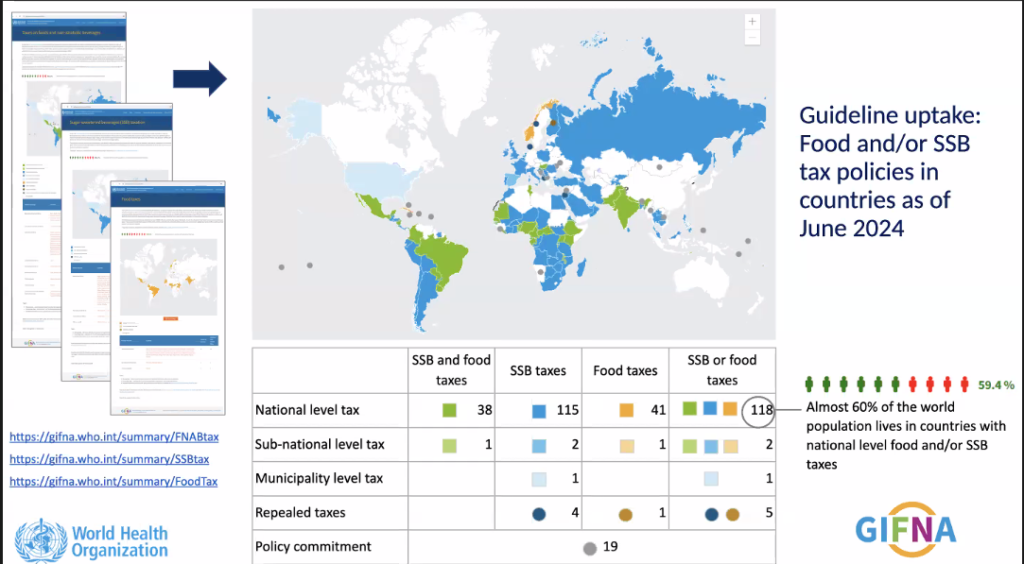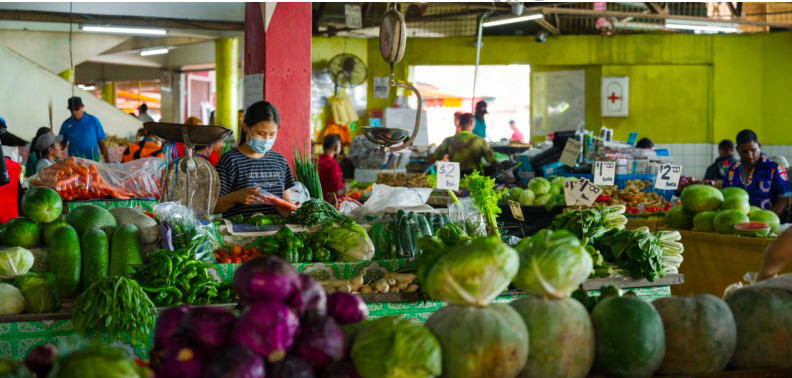
In a first for healthier diets, WHO has issued a “strong recommendation” that countries tax sugar-sweetened beverages as part of a wider effort to combat the powerful health impacts of the industrial foods industry – whose marketing of sugar, sodium and fat-laced, processed foods is linked with millions of deaths annually.
WHO also issued more “conditional” recommendations in favor of the taxation of unhealthy foods and the subsidizing of healthier options, in its new guidelines on “Fiscal Policies to Promote Healthy Diets,” launched Friday.
The first-ever WHO recommendations on food pricing policies comes only days after a scathing report by WHO’s European Region, that found unhealthy foods amongst the top four commercial products that cause some 19 million deaths annually worldwide, including 2.7 million deaths in the WHO’s European Region.
“We need more comprehensive policies,” said Francesco Branca, head of WHO’s Department of Nutrition, at a Friday launch event.
The guidelines are the result of a painstaking process of evaluation of dozens of studies on taxation policies as they affect foods – in line with stringent WHO requirements.
Ample evidence from studies looking at sugar sweetened beverages led to a strong recommendation for more taxation of the drinks that are associated with Type 2 diabetes and other noncommunicable disease conditions, Branca and other experts at the event stated.
WHO recommendations on tax policies for other types of healthy and unhealthy foods, containing excessive fat, salt or processing were more “conditional” due largely to the smaller range of studies on those linkages.
Sugar sweetened drinks

While some 115 countries do impose taxes on comparable international brands of sugar-sweetened drinks, the tax rate is “really low at 6.6% of the beverage price,” Branca said.
And nearly half of the countries that impose such taxes “also include unsweetened beverages like mineral water, which is not unhealthy,” said Branca – effectively canceling out any financial incentive to switch to healthier alternatives.
Only 25% of country specifically target sugar sweetened drinks, as such, he said, concluding that “the value is low, the modalities of the tax are not ideal.”
Taxing unhealthy foods

Meanwhile, only about 41 countries impose taxes on unhealthy foods that contain excessive levels of saturated fats, trans-fatty acids, free sugars, salts and are highly processed, the analysis found.
Such foods are associated with a wide-range of non-communicable disease conditions from added risks of high blood pressure (in the case of salt), to cardiovascular conditions, in the case of saturated fats, and cancers (in the case of processed meat).
Although the WHO recommendation about taxing such unhealthy foods is more “conditional,” the report still rebuts a key argument against taxes against unhealthy foods as well as unhealthy beverages, saying:
“The regressivity of a food tax is a common argument used by opponents of such taxes. However, this argument is based solely on the tax burden incurred by consumers and does not consider the health and economic harm caused by excessive consumption of foods that do not contribute to a healthy diet.
“While considering the financial impact on lower-income populations, policymakers should strive
to design tax structures that target foods that do not contribute to a healthy diet, encouraging a shift towards healthier options,” the report concludes. “This approach aims to strike a balance between safeguarding affordability of foods that contribute to a healthy diet for all income groups, while discouraging foods the consumption of which is associated with negative health outcomes.”
Subsidizing healthier alternatives

In terms of subsidizing healthy foods, WHO’s conditional recommendation was based on “evidence form a subset of targeted food subsidies that provide price incentives to consumers at the retail level, including through rebates, tax breaks, discounts, coupons or vouchers, on targeted foods.
Such subsidies should be applied to foods that are “nutrient-dense, rich in naturally occurring
fibre and/or unsaturated fatty acids, low in saturated fatty acids, trans-fatty acids, free sugars and/or salt, free of non-sugar sweeteners, and/or the consumption of which is associated with positive health outcomes,” WHO recommended.
Insofar as low-income groups often suffer anyway from food insecurity, food subsidies for healthier foods also can help reduce nutrition related inequalities – for a dual health benefit, the WHO report concludes.
Even though the body of health-related evidence is insufficient to recommend “specific policy design elements,” the WHO recommendation is supported by evidence about the “probable acceptability and feasibility, probably favourable cost-effectiveness, and the potential for the intervention to increase equity and support human rights,” the guideline’s authors concluded.
Additionally, they note that unrelated to health, there is ample evidence that “price changes that affect the cost of food can influence decisions on food purchases. So it stands to reason that a subsidy on foods can provide an incentive to purchase.”
Country scorecards
Mexican media campaign warning consumers of the health risks of sugary drinks.
The guidelines also recommend more careful study and monitoring of national food policies – to determine better what works and what doesn’t in terms of taxes, pricing and incentives.
An interactive WHO global database on food and nutrition action (GIFNA), is being developed and updated to provide ratings and scorecards of national performance on key food related nutrition indicators.
This data base includes global mappings as well as national “scorecards” on policies vis a vis dietary risk factors like sugary drinks, phase out of trans-fats, high sodium content, and taxes on unhealthy foods overall.
Image Credits: Bloomberg Philanthropies, Heala_SA/Twitter, WHO, Dr Alexey Kulikov/Twitter, WHO.
Combat the infodemic in health information and support health policy reporting from the global South. Our growing network of journalists in Africa, Asia, Geneva and New York connect the dots between regional realities and the big global debates, with evidence-based, open access news and analysis. To make a personal or organisational contribution click here on PayPal.

